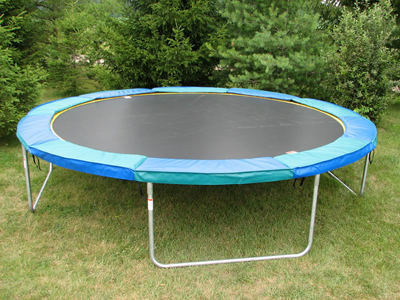Backyard safety concerns for your loved ones.
As the weather warms and children start to play outside, homeowners should consider the liability concerns surrounding backyard playground equipment. Seemingly harmless items such as swing sets, slides, swimming pools, diving boards, trampolines or sandboxes can be a source of danger for small children and adults alike, and may open the homeowners to lawsuits and other legal action in the event of injury. Homeowners should seriously consider adding a $1,000,000 or higher Umbrella Liability Policy to their portfolio to increase protection against Liability claims if they have any of these items in their yards. This will minimize their out of pocket financial responsibility in the event of injury or death.
sets, slides, swimming pools, diving boards, trampolines or sandboxes can be a source of danger for small children and adults alike, and may open the homeowners to lawsuits and other legal action in the event of injury. Homeowners should seriously consider adding a $1,000,000 or higher Umbrella Liability Policy to their portfolio to increase protection against Liability claims if they have any of these items in their yards. This will minimize their out of pocket financial responsibility in the event of injury or death.
Slides are a major source of injuries in the backyard. Metal slides are particularly dangerous, as they can easily overheat in the sun and cause severe burns on small children, but plastic slides can still cause injuries. Children may fall over the side or attempt stunts on the slide. This type of equipment can be difficult to secure properly, which creates even more leeway for lawsuits. In especially hot weather, even plastic slides can heat up to unsafe temperatures and cause burns on small children.
Jungle gyms and play sets can also be put together incorrectly if assembled by an amateur, and caution should be used to prevent collapses. Play sets should always be placed on level ground, preferable with a soft, cushioned substrate surrounding the play area. Note that the substrate should always be placed after the play set has been secured and properly anchored to the ground. See manufacturer recommendations for information on anchoring and securing. Temperatures are a consideration for all play set equipment, regardless of the material it is made from. Metal bars get especially hot and can cause burns.
Before digging in your yard to install your playset or swimming pool, ensure you call your utility companies to have lines marked. Failure to do so can result in damage to electric, sewer, internet, cable, and other lines, and can come with heavy fines and extensive damage to structures. It is also advisable to visit your local city hall to determine if any variances are needed to construct play structures in your backyard. If you have a homeowner’s association, they’ll also need to be contacted, as some HOAs have strict rules regarding play structures in yards and require permission, or outright ban their construction. Taking these steps prior to initiating any construction can keep you from paying fees or having to demolish your play structure.
Trampolines are another dangerous backyard toy for small children. All trampolines should have safety netting, and weight limits should be strictly followed. Children should be properly instructed prior to jumping on the trampoline restrict the stunts or any dangerous jumping activities.
Swimming pools carry very specific dangers, regardless of their size. Ensure all pools are enclosed with a tall fence and a locked gate, or are drained or covered nightly with any ladders or equipment stored separately. Individuals who cannot swim should never be near pools without supervision, and home owners should thoroughly check with their homeowners agent or their insurance policy itself to ensure their pool and any liability connected in injury or death is covered adequately. Care should be taken to restrict access to your pool to unauthorized users, as inebriated individuals are among the most likely to fall prey to an injury or fatal accident as a result of access to an unsupervised pool.
All equipment should be inspected frequently for loosened joints, failure of structural integrity, splinters, and other damage resulting from use or weather. Prevention is the best way to ensure injuries are kept to a minimum. In addition to inspection, children should be trained to report any damage they notice or cause while playing to an adult immediately. Equipment should be repainted frequently to reduce damage, wear, and the possibility of splinters. If possible, look to replace wooden structures with plastic, especially in humid areas or places with large wood eating insect populations.
If cooking or burning fires in your backyard, always remove dry debris from the area before lighting the fire. Check that your fire will have adequate ventilation and is not against flammable materials. Use a screen or other means to keep small children and pets away from the fire, as they may not understand verbal warnings about the heat from fires. Always be aware of grease, and have a fire extinguisher available to put out unexpected sparks or fires. Check to ensure your fire extinguisher is properly rated for the type of fire you will be dealing with- grease fires must be put out with a different type of extinguisher than those burning wood or paper.
Homeowners insurance generally comes with some liability coverage for individuals visiting the home, but this coverage may or may not be adequate to protect your assets in the event of a lawsuit or claim. Clients can visit their Massachusetts insurance agent for information on how to document valuables, determine net worth, and calculate how much insurance coverage is needed to limit liability.
Umbrella policies are a great option for those seeking a additional layers of liability protection, especially since homeowners policies are limited on what they will or will not cover.

